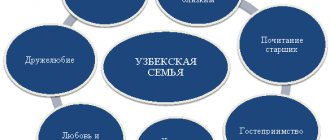Spiritual and moral education of preschool children within the framework of the Federal State Educational Standard
Spiritual and moral education of children and parents
We all know well that the basis of spiritual and moral education is the spiritual culture of society, family, educational institution - the environment in which the child lives, in which his formation and development take place.
Where spirituality is understood as the value dimension of the highest principles: goodness, love, truth, justice, beauty, life, etc. As the priority of such values as Motherland, family, duty, feat, etc. According to the definition of academician B. T. Likhachev, spirituality is this is a moral and aesthetic state of a person, expressed in commitment to such values as freedom, humanism, social justice, truth, goodness, beauty, in an endless internal dialogue aimed at understanding the secrets of one’s purpose and the meaning of life. Morality is a complex socio-psychological formation, consisting of personal beliefs and emotional positions that “control” needs and motives and determine the interests of the individual, his spiritual appearance and way of life. Morality “sets” a person’s behavior from the inside, helps to resist the pressure of negative external influences and counteractions, which ensures a person’s self-respect. Therefore, morality can be defined as a conscious and developed conviction of the individual in the need to adhere to moral standards in relation to the world, people and oneself. Morality is a traditional meaningful form of social consciousness and relations, approved and supported by public opinion. Culture is, first of all, a system of values enshrined in traditions. It is necessary to satisfy spiritual needs and search for life goals, meaning, ideals, and highest values. Today, more than ever, it is important to educate families in matters of spiritual and moral education. A variety of problems bring parents to a teacher-psychologist: difficulties in adapting a child to a preschool or school; difficulties in learning or communicating with adults and peers; violation of behavior, activity, attention, memory; increased child fatigue, motor disinhibition, fears and other neurotic conditions. There are a lot of requests regarding the parents’ divorce, the deterioration of the child’s mental state in the months following the divorce, the child’s inner life is accompanied by painful experiences at this time, many psychological problems arise, and existing problems become aggravated. A large proportion of violations in the development and behavior of children, as professional practice shows, have spiritual and moral roots. The traditional perception of parenthood and childhood is being lost, a third of children are born out of wedlock, while 20 years ago in Russia one child out of twenty was born. In most cases, these children receive less care, less material benefits; often - less love. The cult of success in life, material well-being, professional and social growth has led to a catastrophic decline in the social prestige of motherhood and fatherhood. Modern parents have neither physical nor mental strength left to raise children. Lacking the skills to share family life events with their child, most parents seek to “buy off” personal communication with their child with expensive gifts. And a son (daughter) needs unconditional love and attention. Children should feel that they are needed and wanted. And without understanding and taking into account the peculiarities of communication with children in each specific situation, spiritual progress is not possible either for us or for the children. Children's problems are our problems, and problems begin at home, in the family. This means they can be resolved there too. The most important task of parents should be the full and harmonious development of the child, enriching his inner world and maintaining emotional balance. To educate means to spend your time, your mental strength, and not at all money. To educate means to participate in the life of your child day after day, it means to live his thoughts and experiences. To educate means to form a model of behavior by example. Without example and guidance in goodness, a child loses the ability to develop as a person. The most important thing for raising children is that they see their parents living a great inner life. “A righteous mother is a stone fence, a father teaches his son no harm.” “The son imitates his father, and the daughter repeats her mother.” And what does a child who experiences a lack of warmth, participation, and sincere interest in him learn? Will he be sensitive to others: educators, teachers, peers, classmates? Or he will live by the law of the jungle - every man for himself! Moreover, by “buying off” their child with expensive gifts and entertainment, parents strengthen egocentrism in him, which gains truly shocking proportions by the school years. So, on the one hand, spiritual callousness, and on the other, spoiledness and permissiveness lead to terrifying situations and produce their terrifying results. Rather than listen to a sermon, I would rather look, And better guide me than show me the way. The eyes are smarter than the ears, they will understand everything without difficulty. Words are sometimes confusing, but examples are never. The best preacher is the one who has lived his faith. Good to see in action - this is the best of schools.
And if you show me everything, I will learn a lesson. The movement of hands is clearer to me than a stream of rapid words. It must be possible to believe both thoughts and words, But I’d rather see what you do yourself. In case I misunderstand your correct advice. But I will understand HOW you live, in truth or not. Of course, a lot depends on us specialists.
But from parents - even more. Without your participation and without your help, not even the most wonderful specialist will solve your child’s problems. Don't be afraid to ask for help. But be prepared to make efforts to overcome existing problems, make an informed, informed decision, and help specialists in the development, training, and correction of your child’s problems. Yes, turning to a psychologist is becoming more and more common every day. Fathers began to contact us more often. Divorced, and the wife does not allow him to meet with the child. The mother did not come home for four months. I was left alone with my 3-year-old child. I understand that the absence of a mother is seen as a negative factor, distorting the development of objective relationships, the need for affection, and one’s own image. . . , the formation of the “core of personality” is disrupted. Now the son is with his grandmother, goes to kindergarten. I am a father, I try to maintain calm in the family and instill spiritual values in my son. And how many orphans, deprived of parental care, need psychological help? They have a sharply reduced possibility of new attachments to adults, and the development of the ability to establish close and dialogical relationships is sharply limited. Such children are immediately visible. Their characteristic feature is to lean on another person; unformed image of “I”, which manifests itself in the inability to imagine one’s qualities, much less evaluate them. Another important characteristic is an ambivalent, dual attitude towards oneself: on the one hand, low differentiation, a low degree of awareness of one’s Self, on the other, complete idealization. Unstable self-esteem is combined with the desire for power, significance, and superiority. However, subject to optimal, trusting efforts to communicate in the toy library with peers and adults, development opportunities become real. The child says about himself, although with great effort: “I am super sunshine, everyone is fine with me.” Leaving a baby to the mercy of fate is a terrible sin, an eclipse of the mind. Helping him in trouble with at least something is a rare chance to save souls. In spiritual and moral education, as in education in general, today the stereotype no longer works, according to which the activation of the family’s position is carried out only by informing parents about the successes and problems of the child, in the best case - through a psychologist - pedagogical education of parents . At consultations, the “Toy Library for Everyone”, and the Family Club, we develop the active moral consciousness of the child and parents, teach adults to respond to problems that arise in the development and behavior of their son (daughter), not with irritation and cruel treatment, but, on the contrary, with increased patience and love , wise instruction, heartfelt participation. We believe that the spiritual and moral education of children and parents is the most vital content of our work. So, you also need to be able to thank. If you just say to yourself in the background: “I am grateful to this life for everything that happens to me,” but at the same time a dozen more thoughts will flash through your head, then such “gratitude” is unlikely to help you. Therefore, first of all, we will learn to give thanks. Imagine a fishing line on which you string beautiful pearls and how they turn into a beautiful pearl necklace that you first put on in the morning and take off at night. But gradually you begin to forget to take it off and wear it for several days, and after a while you become one with it. And so you and a beautiful pearl necklace are inseparable from each other, and looking at you, people see only beauty, and it doesn’t matter whether the gentle radiance of pearls gives you this beauty, or whether it’s your graceful neck that emphasizes all the beauty and pristine nature of pearls. And so with gratitude. We will put each gratitude first on a fishing line that we will carry with us. Sometimes, while no one is looking, we will try on our still unfinished necklace at night, or during the day in front of the mirror. Sometimes you will forget to put it on, you will be lazy and you will find a lot of reasons and excuses why you don’t even want to think about your gratitude necklace today. But gradually, stringing pearl after pearl, it will begin to become more and more beautiful and attractive to you. And then there will come a moment when, having put it on, you simply forget to take it off, or don’t want to. And every day you will admire this necklace in the mirror in the morning. And during the day, when your mood begins to deteriorate, or it seems that everything is not going at all the way you wanted, or maybe everything is completely bad, you will, as if by chance, touch the necklace of gratitude and your deeds will immediately begin to seem you are not so bad. And the world will begin to shimmer and smile at you with a radiance of colors. In our version, the fishing line will be a beautiful notebook or diary, and the pearls will be every moment in life and every day for which it is worth thanking this Universe. So let's start stringing the first pearls of gratitude onto your beautiful necklace. Grab a pen and a nice notebook (or maybe just a blank piece of paper) and start writing down all the things you take for granted.
We recommend watching:
Summary of a conversation in the senior group about charity and mercy Open lesson on a moral topic for kindergarten Moral education in a preschool educational institution Summary of OD for children of the senior group in the direction: Moral patriotic education
Similar articles:
Moral and environmental education of older preschoolers
Psychological aspect
Raising children is inextricably linked with psychological concepts. How a child’s cognitive skills and abilities are formed is an important component of the entire process of learning and upbringing.
From a psychological point of view, the approach to preschoolers should be based on the following principles:
- patient attitude towards the individuality of each participant;
- understanding the child’s characteristics;
- accepting the child's characteristics.
The preschool period is the most important part of childhood, which is closely related to the instability of emotions in children, incomplete understanding of their role and requirements for behavior.
A set of techniques and techniques that are used in preschool institutions helps children understand which forms of communication are sustainable and which are undesirable in society or the family.




